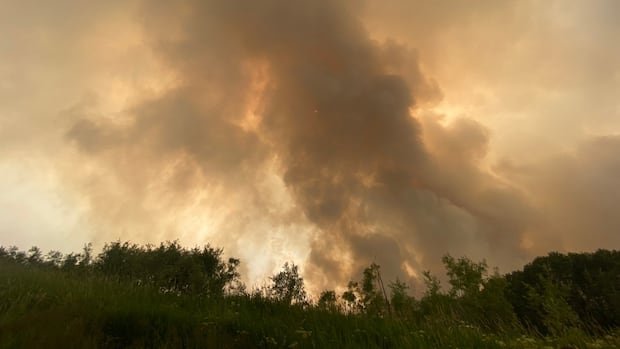People exposed to high levels of wildfire smoke are more likely to seek emergency medical care for respiratory issues, as stated by Dr. Courtney Howard, a Canadian emergency room physician and chair of the Global Climate and Health Alliance. Additionally, rates of heart attack and cardiac arrest tend to rise after a few days of exposure to the smoke.
Dr. Howard emphasized the importance of not attributing chest heaviness solely to asthma, especially for individuals with cardiovascular risk factors. She urged those at risk to visit their local emergency department promptly.
Windsor, Ontario, has endured 14 days under air quality advisories from Environment and Climate Change Canada since the onset of wildfire season on April 1. The recent advisory was lifted following a weekend when the air quality health index entered the high-risk category.
Even in healthy individuals, wildfire smoke exposure can lead to symptoms like headaches, runny noses, and throat irritation, according to Dr. Howard. The smoke affecting Windsor originates from wildfires in Saskatchewan, Manitoba, and northwestern Ontario.
Dr. Howard’s 2018 study on wildfires in the Northwest Territories, summarized in a 2021 report by the Global Climate and Health Alliance, revealed a doubling of asthma cases during the fires. The study also noted a 50% increase in prescriptions for asthma and COPD medications in areas impacted by the fires.
Dr. Mehdi Aloosh, medical officer of health for Windsor-Essex, highlighted an increase in asthma-related emergency room visits in Ontario during the 2023 wildfire season. While the long-term effects of wildfire smoke exposure remain uncertain, studies suggest a potential link to elevated rates of brain and lung cancers.
Dr. Howard recommended pregnant women wear N95 respirators in poor air quality conditions to reduce the risk of pre-term birth. She also warned about the mental health impacts of prolonged exposure to smoky air, which can lead to symptoms akin to seasonal affective disorder and climate grief.
Addressing the issues caused by wildfire smoke necessitates combating climate change, according to Dr. Aloosh. In the interim, investing in indoor air filtration is crucial for both governments and individuals.
Looking ahead, Windsor is forecasted to experience continued smoky conditions due to high-pressure systems. However, southerly winds from the Ohio Valley are expected to improve air quality in the following week. People are advised to monitor air quality levels, adjust activities accordingly, and reduce smoke exposure if experiencing symptoms like eye irritation or coughing.

